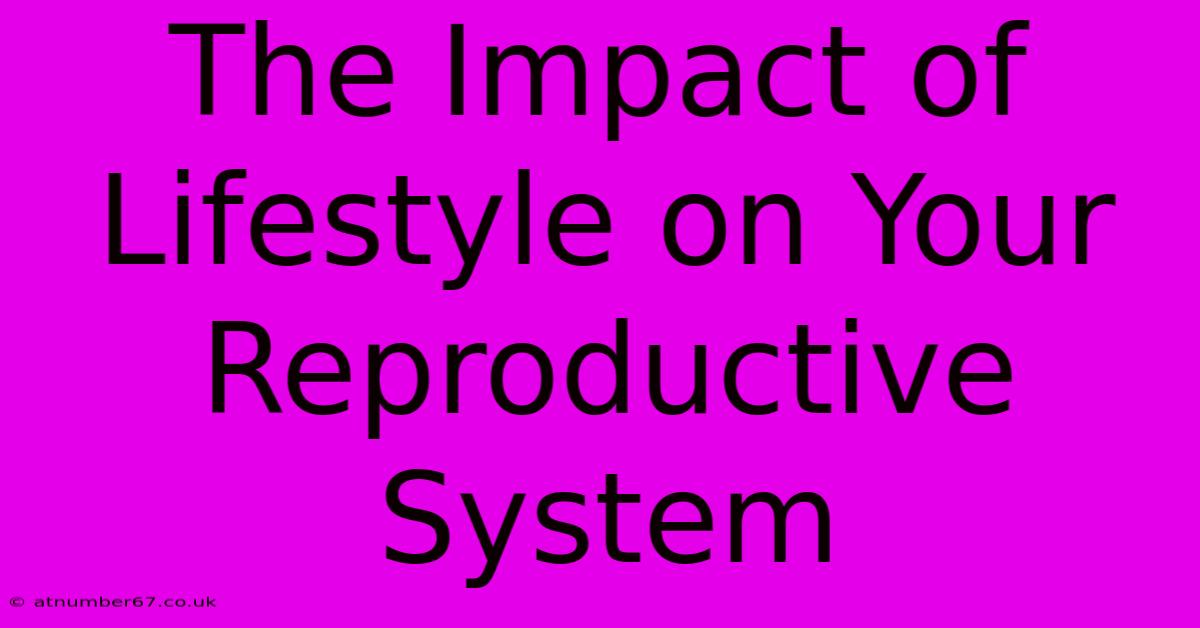The Impact Of Lifestyle On Your Reproductive System

Table of Contents
The Impact of Lifestyle on Your Reproductive System
Having trouble conceiving? Worried about your reproductive health? Your lifestyle choices play a surprisingly significant role in the health and function of your reproductive system. Understanding this connection is crucial for both men and women seeking to optimize their fertility or simply maintain long-term reproductive health. This article delves into the key lifestyle factors that significantly impact your reproductive system, offering insights and actionable advice.
Diet: Fueling Fertility
What you eat directly influences your reproductive health. A balanced diet rich in essential nutrients is paramount.
Nutrients Crucial for Reproduction:
- Folic Acid: Essential for cell growth and development, crucial during pregnancy and for preventing neural tube defects. Found in leafy greens, legumes, and fortified cereals.
- Iron: Supports blood production, vital for both men and women. Found in red meat, spinach, and lentils.
- Zinc: Plays a critical role in sperm production and testosterone levels in men and ovulation in women. Found in oysters, nuts, and seeds.
- Antioxidants: Protect against oxidative stress, which can damage reproductive cells. Found in berries, dark chocolate, and nuts.
- Healthy Fats: Essential for hormone production. Found in avocados, nuts, and olive oil.
Foods to Limit or Avoid:
- Processed foods: High in unhealthy fats, sugar, and sodium, they can disrupt hormone balance.
- Excessive caffeine and alcohol: Both can negatively impact fertility.
- Sugary drinks: Contribute to weight gain and insulin resistance, impacting hormonal balance.
Exercise: Finding the Right Balance
Regular physical activity is beneficial for overall health, but extremes can be detrimental to reproduction.
Benefits of Moderate Exercise:
- Weight management: Maintaining a healthy weight is crucial for reproductive health. Both obesity and being underweight can negatively impact fertility.
- Improved blood flow: Better circulation supports reproductive organ function.
- Reduced stress: Chronic stress can negatively affect hormone levels and fertility.
Risks of Excessive Exercise:
- Hormonal imbalances: Overtraining can lead to amenorrhea (absence of menstruation) in women and reduced sperm production in men.
- Weight loss: Significant weight loss can disrupt reproductive function.
Stress Management: The Silent Saboteur
Chronic stress is a significant factor impacting reproductive health. The body's stress response can interfere with hormone production and ovulation in women and sperm production in men.
Effective Stress Management Techniques:
- Yoga and Meditation: Help to reduce stress hormones and promote relaxation.
- Deep Breathing Exercises: A simple yet powerful way to calm the nervous system.
- Therapy: Provides a safe space to address underlying stressors and develop coping mechanisms.
Sleep: The Restorative Power
Adequate sleep is essential for hormone regulation. Sleep deprivation can disrupt the delicate balance of hormones needed for reproductive health. Aim for 7-9 hours of quality sleep each night.
Substance Use: A Major Threat
Smoking, excessive alcohol consumption, and drug use significantly damage reproductive health. These habits can lead to reduced fertility, birth defects, and other complications. Quitting smoking and limiting alcohol intake are crucial steps towards improving reproductive health.
Environmental Toxins: Hidden Dangers
Exposure to certain environmental toxins, such as pesticides and heavy metals, can negatively impact fertility. Minimizing exposure through healthy lifestyle choices is important.
Regular Check-ups: Proactive Care
Regular check-ups with your doctor or a reproductive specialist are vital for monitoring your reproductive health and addressing any potential concerns early.
Conclusion: Taking Control of Your Reproductive Health
Your lifestyle choices significantly impact your reproductive health. By adopting a healthy lifestyle that includes a balanced diet, regular exercise, stress management techniques, adequate sleep, and avoidance of harmful substances, you can significantly improve your chances of conceiving and maintain long-term reproductive well-being. Remember that seeking professional medical advice is crucial for personalized guidance and support.

Thank you for visiting our website wich cover about The Impact Of Lifestyle On Your Reproductive System. We hope the information provided has been useful to you. Feel free to contact us if you have any questions or need further assistance. See you next time and dont miss to bookmark.
Featured Posts
-
Greg Odens Net Worth What The Experts Say
Apr 02, 2025
-
Best Dad Jokes 2024 Your 2024 Dad Joke Calendar
Apr 02, 2025
-
Zara Mom Jeans The Perfect Denim For Every Occasion
Apr 02, 2025
-
Why Gippy Grewal Chose This Name For His Son
Apr 02, 2025
-
Jo Stanleys Daughter The Untold Story
Apr 02, 2025
